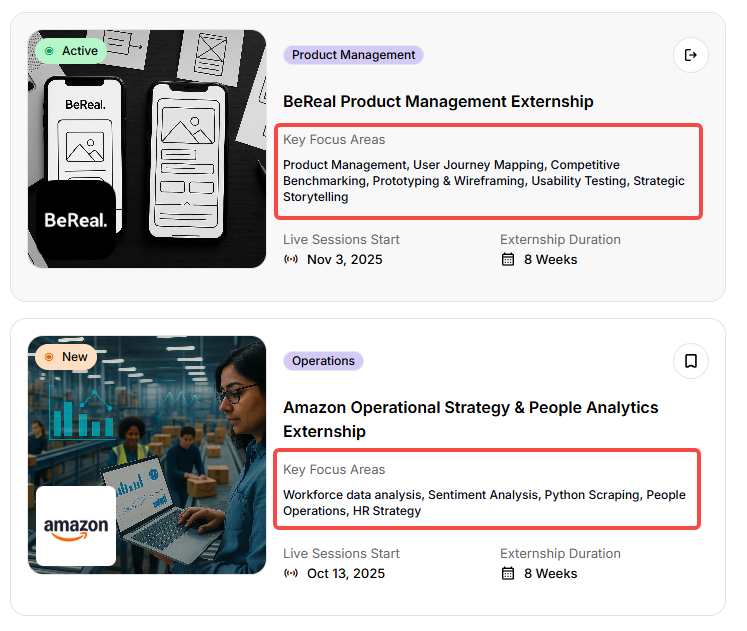💡 What Is the World Economic Forum (WEF) & Why This Report Matters
1. Who the WEF Is
In a job market shaped by AI, green tech, and global disruption, the World Economic Forum’s Future of Jobs Report is one of the most trusted sources for understanding what skills and roles are rising, and which are falling 📊. Released every two years, the report surveys top employers worldwide to identify emerging trends and talent gaps. For Gen Z students mapping their majors and career goals, it offers data-backed direction, not just guesswork.
2. What the “Future of Jobs 2025” Report Covers
The WEF itself is a Switzerland-based nonprofit that brings together leaders from business, government, and education. Known for its Davos summits and global foresight research, WEF shapes how companies and policymakers respond to shifts in the workforce 🌍.Their reports are built on insights from over 1,000 companies across 55 economies; real hiring data, not headlines.
3. Why U.S. & European Students Should Care
In the 2025 edition, WEF outlines how automation and AI are already changing job structures, while also spotlighting the most in-demand roles and future-critical skills. The findings cover both tech-driven and human-centric careers, helping you align your choices with future-proof industries.
“The report captures the perspectives of over 1,000 employers — representing more than 11 million workers across 27 industry clusters and 45 economies.”
— World Economic Forum, Future of Jobs Report 2025 (p. 6)
.png)
🧰 Careers Poised to Grow in the AI Era (2025–2030)
The AI era is not just a buzzword, it is a real-time shift transforming industries, job descriptions, and career paths across the globe 🌍. According to the World Economic Forum’s Future of Jobs Report 2025, more than 69 million new jobs are expected by 2030. Many of these roles are powered by emerging technologies, sustainable innovation, and next-gen digital infrastructure. What do they have in common? A demand for human problem-solvers who can think critically, build systems, and work creatively with intelligent machines 🧠.
“Among the fastest-growing roles are AI and Machine Learning Specialists, followed by Sustainability Specialists and Business Intelligence Analysts.”
— Future of Jobs Report 2025
This is not just relevant for tech majors. If you’re shaping a degree path or considering a pivot, focusing on majors and minors that lead to these growth areas is one of the smartest long-term strategies for staying competitive 📈.
1. Fastest-Growing Roles (by % growth)
These are the careers with the highest rate of growth between now and 2030. They may not add the most total jobs, but they’re expanding quickly and often signal early-stage demand; perfect for Gen Z students building early expertise 🚀.
- AI and Machine Learning Specialists
- Big Data Specialists; Data Analysts and Scientists
- Software and App Developers; DevOps and Cloud Engineers
- Cybersecurity and Information Security Analysts
- Autonomous and EV Engineers
- UI and UX Designers
- FinTech Engineers
AI model builders, DevOps pros, and cybersecurity analysts are not just hired by big tech, they’re in demand at banks: hospitals, agencies, and startups around the world 🌐.
“Technology-related roles are the fastest-growing jobs in percentage terms... Green and energy transition roles also feature within the top fastest-growing roles.”
— Future of Jobs Report 2025
2. Largest Growth (by job adds)
While AI leads in speed, the largest total job creation is happening in care, construction, logistics, and education (roles that combine people skills with data and digital tools 👥)
- Nurses; Personal Care Aides
- Construction Workers; Project and Operations Managers
- Teachers (Secondary and Higher Ed)
- Salespersons; Delivery Drivers
- Food Processing and AgriTech Workers
Project Managers and Operations Specialists are also seeing a major boom. But these are not old-school manager jobs; they now require digital fluency, systems thinking, and automation awareness 🛠️.
“The largest absolute job growth will come from roles such as Agricultural Equipment Operators, Heavy Truck and Bus Drivers, and Health and Care Workers.”
— Future of Jobs Report 2025
Even traditionally non-tech careers are evolving. Whether you’re majoring in biology, education, or design, stacking skills in data, systems, or AI tools will give you a competitive edge across this new economy 🎯.
⚡ Roles Most at Risk from AI and Automation
AI is also phasing out some of the most routine and repetitive ones. The Future of Jobs Report 2025 highlights that automation is set to disrupt millions of roles worldwide, especially in clerical and administrative tracks 🧾. These jobs rely heavily on predictable tasks, structured workflows, and linear processes, exactly the kind of work AI systems are built to handle with speed and accuracy.
“Clerical and Secretarial Workers... are expected to see the largest decline in absolute numbers.”
— Future of Jobs Report 2025
The decline is not just about robots or algorithms replacing humans. It reflects a broader shift in how companies manage operations. Today’s workflows increasingly involve chatbots, document automation, digital assistants, and self-service portals, leaving less need for manual input or paper-based tracking 🗃️.
1. Fastest-Declining Roles
The report shows that jobs like Data Entry Clerks, Postal Clerks, and Executive Secretaries are shrinking the fastest. These roles involve data processing, scheduling, or form-based tasks that can be automated at scale with little human supervision. Similarly, Printing Workers, Cashiers, and Ticket Clerks are being replaced by digital interfaces and self-checkout tools in retail, travel, and hospitality industries 🧾.
Other high-risk roles include Bookkeepers and Claims Adjusters, both centered around rule-based documentation, reconciliation, or intake processes that are increasingly handled by software bots or AI-assisted platforms 💼.
2. Largest Declines (by absolute job loss)
By raw numbers, Clerical and Secretarial Workers are expected to see the biggest drop. This includes jobs across sectors, from education to finance, that were once seen as essential but are now being restructured or automated 📉.
For students in administrative or general business tracks, this is a wake-up call. The future demands adaptability, digital fluency, and cross-functional skills — not just routine task execution 💡.
🔍 AI-Era Skills in Highest Demand (What to Build Now)
As AI continues to reshape industries, skill-building is no longer optional, it is the new survival strategy 🚀. The most in-demand skills are those that combine technological fluency with human adaptability. Employers across the globe are not just seeking coders or creatives; they are looking for thinkers, problem-solvers, and collaborators who can work across systems and silos 🎯.
“AI and big data top the list of fastest-growing skills... creative thinking, resilience, flexibility and agility... expected to rise in importance.”
— Future of Jobs Report 2025 (p. 12)
1. Tech-Forward Skills
AI and Big Data: These are no longer niche skills. Roles in AI and data analytics require understanding how models are trained, how insights are derived from data, and how decisions are made based on predictive analysis. Whether you are in marketing or biology, being able to interpret and act on data is a top-tier skill 📊.
Cloud, Networks, Cybersecurity: As companies digitize operations, skills in cloud infrastructure, network design, and security are critical. Careers in cybersecurity now go far beyond IT; they involve risk mitigation, regulatory compliance, and securing AI models themselves 🔐.
Coding, APIs, and MLOps: The ability to write and deploy code, connect systems using APIs, and manage machine learning operations is essential. These skills are used in everything from e-commerce to healthcare to finance. Even if you are not a full-time engineer, understanding how automation workflows are built is a major plus ⚙️.
2. High-Leverage Core Skills
Analytical Thinking and Problem Framing: These are must-haves in every job that involves ambiguity. Whether you are building a dashboard or planning a campaign, framing the right question is more important than ever 🔍.
Flexibility, Agility, and Learning Velocity: The half-life of skills is shrinking. What matters now is how quickly you can pick up a new tool, unlearn outdated methods, and pivot when needed 🧠.
Leadership, Social Influence, and Collaboration: AI will never replace your ability to lead people, navigate group dynamics, or influence outcomes. These soft skills are now career accelerators across industries.
Creative Thinking and Product Sense: With automation handling routine execution, the value of creativity is rising. From UX design to product management, your ability to envision solutions and build them will be core to your career 🎨.

3. Skills Likely to Decline
Skills rooted in routine physical execution are on their way out. These include:
- Manual assembly or packing without robotics support
- Data transcription and form filling
- Low-level administrative tasks like appointment scheduling or document formatting
These tasks are increasingly handled by AI systems, especially in industries like logistics, customer service, and back-office operations. Students relying solely on manual skills without technical augmentation will be most at risk 📉.
To stay competitive, build a portfolio that showcases both technical fluency and human-centered problem-solving. These are the skills that will carry you, not just through the AI wave but well beyond 🌊.
🧠 Real-World AI Job Listings You Can Apply To Now
If you already have strong technical skills or are finishing a relevant degree or externship, here are some AI-heavy roles hiring right now. These are pulled from active listings on platforms like Indeed and Amazon a mix of engineering, analytics, and security. Great examples of where your skills can go 💼
1. Lead Machine Learning Engineer
Description: Work on core ML systems, modeling, pipelines, model deployment, and continuous evaluation.
Annual Salary: $150,000 - $180,000
2. Machine Learning Role – JPMorgan
Description: Design scalable AI/ML solutions for financial use cases. Requires strong experience in algorithms, data pipelines, production systems.
Annual Salary: $128,250 - $195,000
3. Data Scientist, Algorithm
Description: Develop models, integrate into product, monitor and improve performance.
Annual Salary: $120,000 - $200,000 a year
4. Cyber Security Analyst
Description: Focus on research and applied ML, collaborate with cross‑functional teams to deploy AI tools.
Annual Salary: $72,763 - $110,000
💼 Putting It Together: 10 Best-Paying, AI-Resilient Majors (U.S., 2025)
Wondering which majors are worth the tuition in a post-AI job market? These ten degrees map directly to roles with growing employer demand, low automation exposure, and strong earning potential💸. Whether you are planning your first degree or pivoting mid-career, this list is built for long-term resilience and high ROI with role paths to guide your strategy 🔍.
⚠️ 10 Majors With Higher AI and Automation Risk (U.S., 2025)
Choosing a major today means understanding not only what pays well but also what risks being automated tomorrow 🤖. The following ten majors have been flagged by workforce data and employer surveys as high-risk for automation and AI disruption. While not doomed, these paths require extra strategy and skill stacking to stay relevant in the evolving job market.
The Watchlist (U.S., 2025)
1. Accounting (bookkeeping-heavy)
Roles centered on ledgers, payroll, and routine reconciliation are increasingly handled by AI-powered software. Automation tools like Xero and QuickBooks now handle tasks that once required full-time staff 📉.
2. Finance (bank ops focus)
Students focused on teller functions, loan processing, and basic operational tasks face a shrinking field. FinTech apps and AI compliance tools are replacing repetitive financial workflows.
3. Business Administration (clerical-leaning)
Degrees that lean heavily on general management without technical skill sets are vulnerable. Admin tasks are being replaced by SaaS platforms that streamline team coordination and office workflows 🗂️.
4. Marketing (telemarketing or low-bar content)
Basic outreach, cold calling, and generic content creation are increasingly handled by AI tools. Without specialization in product, analytics, or branding, roles may disappear faster than expected.
5. Journalism (layout and distribution)
Template-based reporting and content syndication are now managed by AI. Writing that lacks analysis or investigative depth is at risk of being replaced by algorithmic feeds 📰.
6. Graphic Design (print or static-heavy)
Designs for non-interactive, non-digital media are being overtaken by AI image generators and templates. Entry-level designers face stiff competition unless they pivot to UX, motion, or product design.
7. Legal Studies (non-JD)
Paralegal and document-prep roles tied to contracts, filings, and basic legal research are under pressure. Legal AI is increasingly capable of drafting and reviewing standardized documentation ⚖️.
8. Hospitality and Tourism (front desk roles)
Many hotels, airlines, and tourism platforms now use kiosks, apps, and AI for check-ins, ticketing, and reservations. Human-facing roles must now compete with software convenience.
9. Insurance and Risk Management (claims-heavy)
Claims processing, data entry, and basic risk review are being automated by smart systems and chatbots. The human role shrinks unless paired with analytics or compliance expertise 📊.
10. General Office Administration
Secretarial and assistant roles focused on calendar management, data entry, and memo drafting are being consolidated or replaced by productivity platforms.
💡 Tip:
These majors can stay competitive by layering in tech-forward skills. Consider adding electives or certificates in data analytics, automation tools, or product management. Roles with domain knowledge and tool fluency remain valuable — even in fields facing disruption.
.png)
🎓 How to Navigate College in the AI Era (Action Plan)
Choosing your major is no longer just about passion. It’s also about resilience, adaptability, and relevance in a shifting job market 🎯. According to the World Economic Forum’s Future of Jobs Report 2025, the most valued graduates will combine deep domain expertise with a strong layer of tech fluency and ethical awareness. Whether you are an undergrad or postgrad, here’s how to future-proof your college journey.
1. Degree-Stack Strategy
Start with your core passion or industry: healthcare, finance, design, or anything else that aligns with your interests. Then stack a minor or certificate in data science, computer science, cybersecurity, or operations analytics 📊. These supporting disciplines turn any major into a launchpad for AI-literate roles.
Additionally, look for domain-specific AI electives. Think along the lines of “AI in Healthcare,” “Marketing Analytics,” or “Data Ethics in Finance.” These focused classes can set you apart from peers who only have general coursework. As the WEF notes,
"Big data analytics, AI, and cybersecurity remain among the top skill priorities through 2030" (page 23).
2. Learning Ops That Compound
Build what many experts call a “T-shaped profile”, deep knowledge in your field, plus wide literacy in tech, automation, and collaboration 🧠. Use class projects to practice with real tools: Python for analysis, SQL for databases, APIs for automation, and cloud platforms like AWS or Azure for infrastructure basics.
The WEF recommends a “skills-based approach to learning” that includes self-led training, short courses, and applied practice environments all of which are essential for bridging the classroom and workplace.
3. Portfolio & Proof
Having a polished GPA is great, but in 2025, proof of skill will set you apart. Aim to ship three to five projects that showcase your ability to apply knowledge. These can be dashboards, Jupyter notebooks, automation scripts, case studies, or user testing deliverables.
To increase impact, include metrics: accuracy improvements, time saved, or user engagement 📍. Employers and externship programs now assess portfolios just as seriously as resumes, especially in tech-forward roles.
4. Responsible AI & Data Ethics
Understanding AI also means understanding how to build and use it responsibly 🔐. There’s a growing demand for skills in privacy, security, regulatory compliance, and ethical AI. Learn the fundamentals of FERPA, HIPAA, GDPR, and SOC 2, depending on your career interest.
Take at least one course or workshop in ethics or data governance. Whether you're in healthcare, law, product, or design, knowing how to spot bias, ensure transparency, and protect user data is now considered core competency, not optional.
🧱 Win the AI Era with an Externship
🌟 Practice Real AI + Core Skills on Extern
You do not have to wait for graduation to prove your skills. With Extern, you can join a mentor-led, remote externship that gets you hands-on with the same tools top employers use 🔧. You will learn by building real projects in AI, Python, SQL, data pipelines, and product analytics.
Extern programs help you practice high-value skills like analytical thinking, product intuition, and clear communication. The exact traits the World Economic Forum says are rising in value across industries. Every externship includes feedback, coaching, and deliverables you can include in your portfolio or on your resume 📁.
You will finish your externship with measurable outputs, like dashboards, UX case studies, and AI prototypes, proof that you can thrive in a tech-forward job market.
Explore Extern today and start stacking experience that aligns with your future 🚀.

.png)



